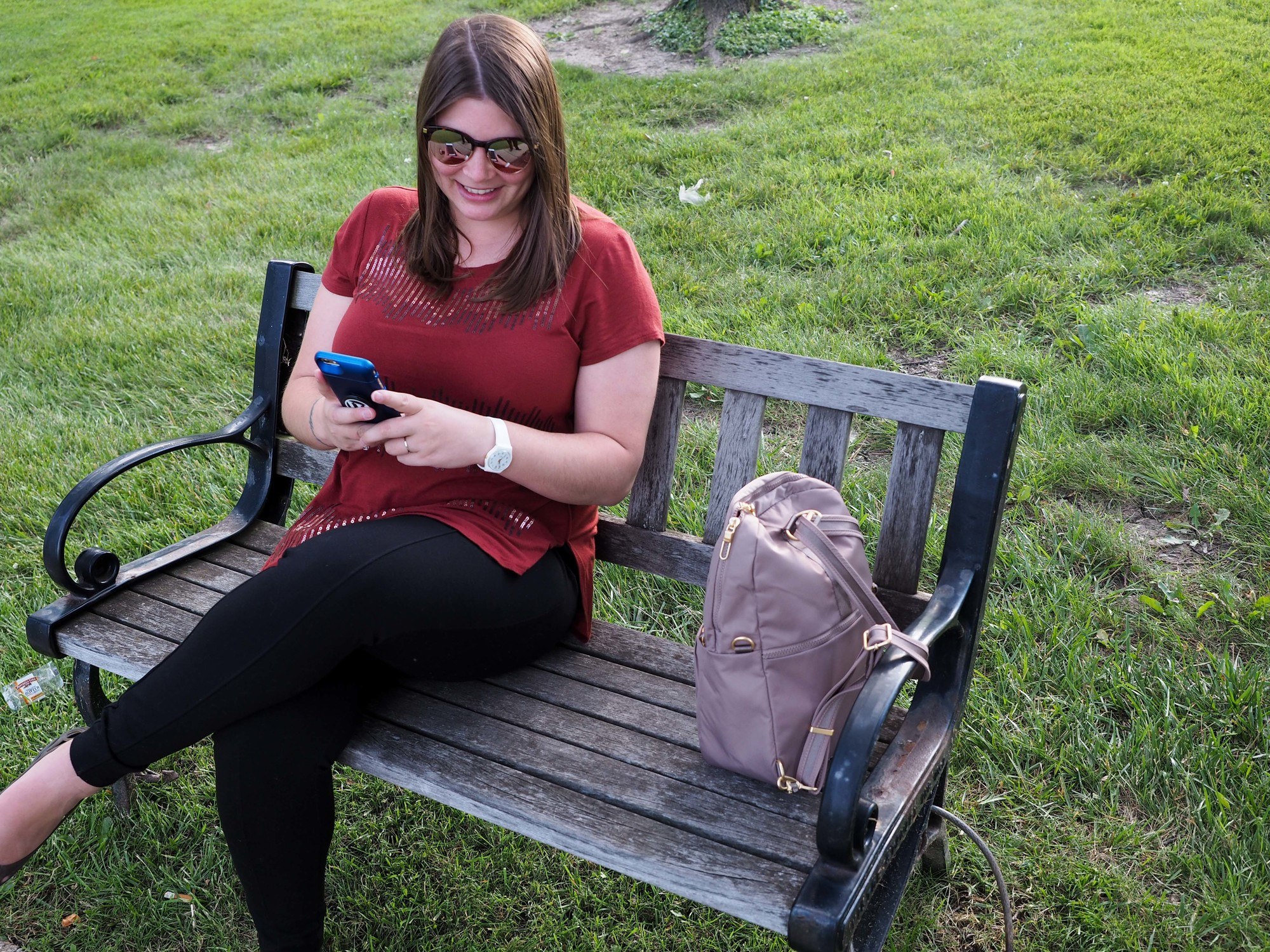How to Keep Your Money and Valuables Safe While Traveling

I got an email last week from a blog reader: a more mature American woman who was considering booking a solo adventure, but who was curious about whether traveling on her own would make her “a target” for thieves and other unsavory types.
Now, I'm a huge proponent of solo travel, and always stress the fact that the world “out there” isn't nearly as scary or dangerous as many people believe – as long as you're smart about it. Because yes, there are certain circumstances where being a tourist can make you a target for petty crime.
But the good news is that there are simple steps you can take to keep you and your belongings safe on your travels, whether you're traveling solo or not.
9 ways to keep money and valuables safe when traveling
In order to help this reader and any others with similar concerns, I decided to share all my tips for keeping your belongings safe on your travels. These are tips that just about anyone can use, whether you're traveling closer to home or halfway around the world (because, remember, theft and crime can happen anywhere!).
1. Don't take more than you need
Keep this tip in mind when planning and packing for your trip. There's no need to travel with expensive jewelry, electronics you won't use, every single credit card you own, or large sums of cash. ATMs are readily available in most countries, and as long as you call in advance to let your bank know you'll be traveling, you should have no problem taking out money abroad a bit at a time.
This tip also applies to when you're out exploring in a new city (and especially if that city is known for pickpocketing) – don't take more with you than you're prepared to lose. I always keep a little cash and one credit card in my wallet when I'm out and about; the rest stays locked up in my room!
Some people even travel in large cities with a “dummy” wallet – i.e. a decoy wallet that can be handed over in the case of a robbery that maybe has a little cash and an expired ID inside it. I've never done this, but it's something you could try if you're really concerned about it.
2. Make use of your hotel/hostel safe
Speaking of keeping things locked up in your room… Make use of your hotel safe or hostel locker for things like your passport and extra credit cards/cash. Is this a complete guarantee that your valuables will be safe? No, not really, but it's certainly better than carrying everything on you at once.
(And this definitely applies to your passport – there are *very* few destinations where you'll need to have your passport on your person at all times, and it's much less likely to be stolen out of your hotel safe than out of your bag on a metro or at a busy tourist attraction.)

But what if you're staying in an Airbnb rental or somewhere without a safe? Or what if you're traveling with electronics that are too large for a standard-size hotel safe? In these cases, consider picking up a portable safe from a company like Pacsafe. This “safe” doesn't take up much room in your luggage, and is therefore super handy for traveling. You can lock this safe around anything fixed or sturdy in your room (think pipe, sink, bed frame, etc.), and have some peace of mind that your valuables won't be easy to just pick up and walk off with.
(You'll also definitely need a good padlock or two, for your Pacsafe safe, a hostel dorm locker, or even just for locking your luggage when you're out of your room. I recommend these cable combination padlocks.)
3. Don't make yourself an easy target
Most instances of theft abroad are crimes of opportunity; tourists don't actually get violently robbed very often in most parts of the world. So one of your best defenses is to not make yourself an easy target.
And how do you make sure you're not an easy target? Here are a few tips:
- Don't flash your valuables around, especially on public transportation.
- Don't leave valuables sitting out in your hotel room or hostel common room.
- Don't leave your things unattended on travel days.
- Don't carry a bag that is easy for someone to grab off your shoulder.
- And definitely don't take out a huge wad of cash in public.
Basically just don't make it easy for someone to rob you!
4. Know where you might be most vulnerable
This goes without saying, but you want to pay attention and be aware of your surroundings when you're out and about on your travels. No matter how hard you try, you probably ARE going to look like a tourist – because you are one! So just be vigilant – make sure you zip up your bag, don't set things on the floor or anywhere where you can't see it, and keep in mind the places where you might be most susceptible to petty crime.
For example, if you're traveling in Europe, the most likely places for theft to happen include:
- On the metro or other public transit, especially on the most touristy lines (Metro Line 1 in Paris, for example)
- In very crowded squares outside the most popular tourist attractions
- And even INSIDE popular museums or tourist attractions

It's also a good idea to do a bit of research on popular tourist scams/pickpocket techniques in the places you're traveling to. Taxi scams, money exchange scams, and the main ways pickpockets might try to target you are usually written about online.
In Europe, be wary of anyone trying to hand you something (like a flower or a bracelet), or anyone trying to get you to sign a petition. These are often scams, or distractions to make it easy for someone to rob you. In some big South American cities, beware someone spilling something on you and then offering to help you clean it up in the bathroom – this is a big known tactic used by pickpockets!
5. Invest in a theft-proof bag
One of the easiest ways to make petty theft/pickpocking more difficult is to travel with a theft-proof bag (or two). My favorite company for anti-theft bags is Pacsafe. They make bags that are slash-proof, RFID-blocking, water-resistant, and just really sturdy, making them great for keeping your valuables safe when you're traveling.
I own more Pacsafe bags than I care to admit (seriously, guys, I think my current count is up to 8), but they' so good that I just can't stop buying them.

If you're looking to purchase a good theft-proof bag, I recommend a cross-body handbag for the ladies (this makes it much more difficult for someone to swipe your bag off your shoulder as you're walking around), and a small anti-theft backpack for the men.
(Or you can do what I do and basically buy one of everything! I have two small cross-body handbags, a convertible backpack, a small daypack, a sling bag, and a camera backpack (actually two in different sizes) from Pacsafe, and I basically never travel anywhere without at least one of them!)
Pacsafe bags all have slash-proof straps and lockable zippers, so when I'm in a crowded area I just make sure everything is locked up and then I don't have to stress about it as much.

6. Keep things close on travel days
The days when I'm always the most nervous about theft are travel days – those days when you don't have a choice but to travel with all of your money and valuables at once, whether it's by plane, train, bus, or boat.
On these days, you definitely want to make sure to keep your most prized possessions as close to you as possible. I always have my laptop and camera in my Pacsafe backpack on days like these, and *never* put that bag under the bus or on a luggage rack on a train.
In destinations where pickpocketing is common, I go one step further and put my passport, most of my money, and my most important credit card somewhere other than my purse. My current go-to is a hidden pocket scarf from Speakeasy Travel Supply – these scarves are not only fashionable, but also have a hidden pocket large enough for all those things I mentioned.
Other ways to keep the “important stuff” hidden on travel days are using a money belt, neck pouch, or other clothing with hidden pockets. (They even make hidden bra pockets for the ladies!)
(I don't, however, recommend using a money belt or neck pouch for your day-to-day sightseeing. If you're constantly digging down your shirt or into your belt for cash, that just lets everybody around you know exactly where you're hiding things.)
7. Be careful with your phone
Phone theft has been on the rise for years, ever since everyone in the grandmother started carrying around smartphones worth $1000+. I've read many, many stories of people having their phones stolen out of bags, pockets, and even straight up out of their hands!
If you're walking around a more touristy place with you phone, be very aware of where you put it. Don't tuck it into the front pocket of your purse or the back pocket of your jeans. Avoid looking down at it non-stop while you're walking if it means you can't pay attention to your surroundings.
I've started traveling with a lanyard strap for my phone. No only does it mean I'm not dropping it ever, but it also gives me a bit more peace of mind when I'm out in public with it. I wear the strap cross-body, and feel like it might deter someone from trying to snatch it since it doesn't offer a quick grab-and-run type of opportunity.

Here are two lanyard options: this inexpensive one that comes in lots of colors, and this fancier leather one with a sleeve for an ID/credit card. (For the record, I own both of these! The Bandolier one is the one in the above photo.)
8. Have a back-up stash
If you follow the above tips, you'll be well on your way to protecting yourself and your stuff from theft. But there's no way to 100% prevent having something stolen when you travel. I always plan for the worst eventuality (i.e. having my entire purse or day bag stolen), and always travel with a back-up credit card and cash (usually $100 USD) – just in case.
I hide this back-up stash in my main luggage, usually in an inside pocket or compartment where it's not easily accessible/noticeable.
If you really want to get creative, you could hide your back-up stash of money in an inventive spot, like in an old tube of chapstick, in between souvenir postcards, or mixed in with your makeup or toiletries. (I once even tucked money into the pouch where I keep emergency tampons!)
I honestly think hiding money is going a bit far since, as I've said, most theft happens when an easy opportunity presents itself. But go for it if it helps you feel more protected.
9. Don't skip travel insurance
And, at the end of the day, it's always smart to get a good travel insurance policy for those “just in case” situations. Travel insurance is vital for health issues and accidents/injury abroad, but in many cases can also help you out if your stuff gets stolen, too.
Different rules apply for different nationalities, but in most cases if you get a police report for a stolen item, your travel insurance can help you replace the item, or at least reimburse you for some of the value.
I have used various travel insurance companies over the years, including World Nomads, Seven Corners, and Allianz. You'll need to compare plans/coverage to figure out what's right for you, but I definitely wouldn't skip it for a big trip!
BONUS: Protect your data online with a VPN
While this post is dedicated to how to protect your possessions from theft while traveling, there's another thing you might want to protect when you're away from home: your identity and data online.
When you travel, you're probably connecting to all sorts of different wifi networks. Most of these are free and unsecure, meaning any info you're entering (passwords, payment information, address details, etc.) is not private and can be vulnerable.
If you want to protect your information online when you travel, the easiest thing to do is to get a VPN, or Virtual Private Network. The top reason to get a VPN is to encrypt your online activity and keep it safe from hackers and other nosy people. Using a VPN is pretty simple – you just start it up when you want to use it like any other application. You can use one on laptops, tablets, and smartphones alike, too, meaning you can easily keep all your browsing info private.
(An added bonus of using a VPN is that it can also help you get around destination-based firewalls and limitations; your VPN makes it look like you're logging on from a private network in whatever country you choose – I've used my VPN to watch Netflix abroad, or to access sites that might be blocked in certain countries.)
If you're interested in getting yourself a VPN, I personally use Express VPN on both my laptop and iPhone!
What are some things you do to keep your belongings safe when you travel?
Pin it for later:


Amanda Williams is the award-winning blogger behind A Dangerous Business Travel Blog. She has traveled to more than 60 countries on 6 continents from her home base in Ohio, specializing in experiential and thoughtful travel through the US, Europe, and rest of the world. Amanda only shares tips based on her personal experiences and places she's actually traveled!















Extremely useful tips! Thank you so much!
Like you, I prefer to leave my passport in the hotel safe but I have to write myself reminders in case I forget to take them out! How about you?
Leaving yourself a reminder is a good idea! Some people suggest putting one of your shoes (assuming you’ve packed more than one pair) into the safe, too, as you’re more likely to notice a missing shoe as you re-pack your bag.
I love, love, love PacSafe bags. I think we have 9 in our household. You need one for every trip or special event.
Absolutely agree!
[…] your money, passport, wallet and other valuables in a safe place at all times. Typically, this means carrying these items on your […]
Good basic tips for people. Sometimes when traveling, people forget about these rules for various reasons, but mostly because of emotions. But following these rules you will protect yourself in 90% of cases.
Thanks for the article, added to my bookmarks:)
Good point about the VPN! I’m always paranoid when I travel abroad and connect to an open WiFi – you never know who might be lurking!!!
Exactly! And once you have one, it’s so easy to use – no reason not to, really!